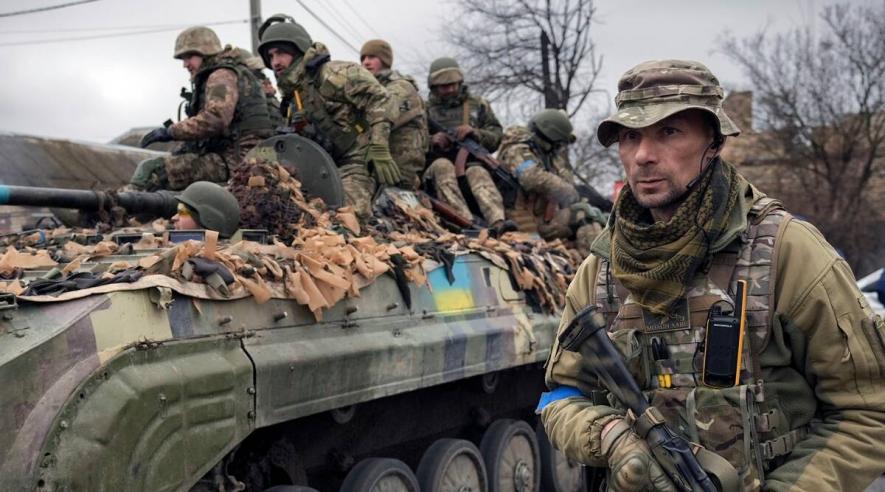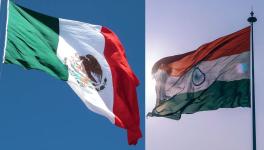Political Economy Implications of the Conflict in Ukraine on Europe

Image for representational purpose. Credit: The Indian Express
The conflict in Ukraine has had significant adverse consequences on all economies of the world. The key link in the transmission process has been the economic war on Russia that has been initiated by the United States and its “allies” such as the European Union. The gratuitous appropriation of half of Russia’s foreign exchange reserves and delinking of several Russian banks from the SWIFT system by the United States and its “allies” did not result in a financial collapse in Russia. Nor did it lead to the government of the Russian Federation agreeing to a settlement to the conflict in Ukraine that is acceptable to the United States.
As a result, the United States and its “allies” had two feasible options: engage in an even-handed diplomatic process to settle the conflict in Ukraine or escalate the economic war on Russia. The latter option has been chosen. But there are two significant problems with this option of escalation: first, most countries other than “allies” of the United States have decided to disassociate themselves from the economic war against Russia; second, Russia is an indispensable supplier of primary commodities and defence equipment to the world.
Therefore, subsequent rounds in the economic war against Russia have been less significant. However, there have been active discussions on moves in the European Union to cut Russian energy supply (both oil and natural gas) to Europe. The European Union, had earlier announced that its coal imports from Russia will be phased out, but the cut off date has been extended. Russian natural gas is used for power generation, as input for industrial processes and for domestic purposes (for cooking, heating etc). All this is happening in spite of the fact that if this does actually come about then there would be disastrous implications for economic activity on European economies including a significant fall in economic activity and a marked rise in inflation. This will be the case since there are no feasible substitutes for countries of the European Union to Russian energy (more so in the case of natural gas) for the next few years. As a result, more and more European buyers of Russian natural gas have acceded to or are in the process of acceding to Russian demands for payments for its natural gas in rubles. The economic crisis in the countries of the European Union will also be further accentuated by the large influx of Ukrainian refugees.
Within the European Union, the recent attempt to ban Russian oil imports was stoutly opposed by a number of member countries, especially Hungary. Likewise, shipping companies based in Greece have vetoed any European Union ban on the use of their tankers to transport Russian oil to countries outside the European Union.
Even if alternatives to Russian energy for European countries are found over time they will be more expensive. This will reduce the price competitiveness of European (primarily German) exports. The number of German exports that are price inelastic (i.e. based on quality competitiveness) and therefore relatively immune to this rise in prices, will depend on a number of factors. First, Russian energy is likely to be redirected to China at discounted prices which will markedly widen the price gap between Chinese and German exports to an extent that may erode the price inelasticity of German exports. Second, if China moves up the “technological ladder” then the number of German manufactured commodity exports whose demand is inelastic to price changes will shrink over time. Third, Japan, in spite of being an “ally” of the United States has been less willing than the European Union to engage in an economic war against Russia. Consequently, the price competitiveness of its exports will be less adversely impacted than Germany. Therefore, Japanese exports may begin to outcompete German exports, especially in such high technology sectors where they are substitutes for each other.
German businesses may seek to arrest this slide in the price competitiveness of exports by squeezing wages. But this squeeze will reduce output, employment, capacity utilisation, investment and technical change unless there is explosive growth in German exports as a result of the wage squeeze. But this explosive growth of German exports is quite unlikely to materialise in a global economy that has been adversely impacted by both the Covid-19 pandemic and the conflict in Ukraine. In such a situation importing countries whose output is an alternative to Germany will tend to erect tariff and non-tariff barriers to such German exports.
In such a scenario of stagnation and inflation, even the most reliable Euro-denominated government securities, those of the German government, as far as international finance is concerned, will become less attractive relative to alternative financial assets. This is likely to result in a depreciation of the Euro vis-a-vis the United States dollar and other financial assets that are considered relatively safe by international finance. An increase in the rate of interest on such German government securities to try and retain the confidence of international finance will accentuate economic stagnation.
But the rhetoric about intensifying the economic war on Russia, which is self-defeating, but emanates from many quarters in the European Union sometimes seems more strident than that in the United States. However, the minority mainstream opposition to the “aiding” of the military conflict in Ukraine is informed by cynical Right-wing demagogy in the United States. If we safely rule out “ideological motives” such as “war on Ukraine is a war on Europe as a whole” then such a stance of intensifying the economic war on Russia in the European Union still needs to be explained.
It is in the objective strategic interest of the elites of the United States to weaken the economies of countries of the European Union, especially that of Germany. This is the case since such a weakening will diminish the strategic autonomy of countries in Europe and compel them to become more “reliable allies” of the United States. In a world where the strategic breach between China and Russia is steadily declining the United States will require a greater number of “reliable allies”.
For instance, the strident opposition of the United States to Nordstream 2, the direct undersea natural gas pipeline connecting Russia and Germany emanated from such a stance. Nordstream 2 would have bypassed the countries of eastern Europe over whom the United States has more “leverage”. Consequently, the ability of the United States to strategically influence Germany would have diminished somewhat. Likewise, the United States did not allow the Normandy Format (involving France, Germany, Russia and Ukraine) to arrive at a diplomatic solution to the conflict in Ukraine since such a resolution would have resulted in its strategic attenuation. This sowed the seeds of war in Ukraine.
Within the countries of the European Union there exist political entities/individuals that actively promote the objective strategic interests of the United States. This includes governments, political parties, the bureaucracies of the European Union and the North Atlantic Treaty Organisation. “intellectuals” etc. This is the case, even if some of these individuals subjectively see themselves as working to uphold the tenets and practices of “Western Civilisation”.
This disarticulated nature of the political economy of countries in Europe is a principal reason whereby self-defeating policy proposals can become near-hegemonic. Therefore it is facetious as well as erroneous to claim that such policies are being adopted or sought since governments in Europe feel “morally compelled” to act due to the ongoing conflict in Ukraine. However, the Zelensky Administration in Ukraine, curated by the United States, does couch its public posture in terms of “European solidarity”. This public facade, which cannot be publicly contradicted in any European country, given the disarticulated political economy therein, is the means through which the United States is able to exert its coercive influence on what is left of strategic autonomy in Europe.
Recently, the Zelensky administration has blocked the transit of Russian natural gas transit through one of the pipelines connecting Russia to Europe. It is possible that this decision was curated by the United States. Further, the Russian government has sanctioned the company handling the Polish section of the Yamal pipeline from Russia to Europe. This process of escalation, if not checked and reversed, will adversely impact the economies of Europe. However, this will require a resurgence of strategic autonomy in Europe and to begin with, in Germany and France. This resurgence could also initiate a process of engagement that could enable a negotiated diplomatic solution to the conflict in Ukraine. But this will require a political reckoning with the disarticulated political economies of various countries in Europe. Such a process of re-articulation will be fortified if the Left in European countries actively organises to shape its contours.
C. Saratchand is a Professor at the Department of Economics, Satyawati College, University of Delhi.
Get the latest reports & analysis with people's perspective on Protests, movements & deep analytical videos, discussions of the current affairs in your Telegram app. Subscribe to NewsClick's Telegram channel & get Real-Time updates on stories, as they get published on our website.























